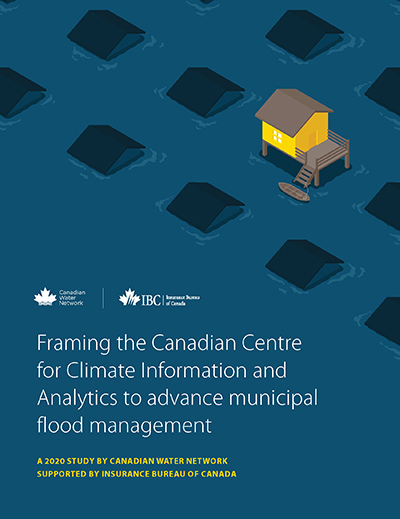Advancing Municipal Flood Management through Effective Knowledge Curation
Canadian Water Network, Insurance Bureau of Canada (2020)

Challenge
Extreme weather events and their impacts represent a major challenge for Canada’s people, environment and economy. Fluvial and pluvial flooding has caused significant damage to communities in Canada over the past two decades. For all sectors, responding to this challenge requires that we develop effective approaches to manage the risks involved by better identifying, understanding and responding to them. An opportunity exists to make more effective use of the data, information and knowledge we already have and are currently generating to better inform decisions.
Data and information are generated for a wide variety of reasons, typically in response to individual needs and mandates. As a result, data and information are not optimally designed for ― or even delivered to ― others who could make good use of them to inform their own decision making. Effectively leveraging the various data and information initiatives for a variety of needs, such as evidence-informed flood management decisions, is a key opportunity for multiple sectors.
Municipalities, provincial and federal levels of government, and the insurance sector all conduct activities that involve identifying and mitigating risks posed by major storms and flooding to communities. As a result, they all hold key elements of the knowledge base needed to effectively identify and prioritize areas requiring action. An important near-term goal is generating an approach to maximize the collective value of the knowledge sources by more effectively leveraging and curating the data and information that is already being generated by each sector to better inform risk evaluation.
Project
With the support of Insurance Bureau of Canada (IBC), Canadian Water Network (CWN) and Smart Prosperity Institute (SPI) have generated recommendations on the successful structuring of the Canadian Centre for Climate Information and Analytics (C3IA) as an authoritative source of climate information and decision analysis (see Mobilizing Finance for Sustainable Growth, the final report of the Government of Canada’s expert panel on sustainable finance). CWN generated objectives and framing for a made-in-Canada solution for improved data and information, knowledge sharing and curation that is useful for municipalities to improve flood risk evaluation, identification and mitigation in Canadian communities. In tandem, SPI led a needs assessment for the financial sector. Both assessments will ultimately generate recommendations that feed into informing the successful structuring of the C3IA.
Outcomes
For the C3IA to be useful for and used by Canadian municipalities, CWN’s final report recommended that it should employ a phased approach to deliver the following functions:
- Curation of relevant data and information.
- Curation of different kinds of data and information products from different sectors.
- Provision of advanced expertise on data analytics that could advance flood risk assessment and hazard mapping.
The curation of data generated by other sectors would enable municipalities to compare similarities and differences with how flood risk is identified and assessed by other sectors, resulting in a more complete picture. The provision of data analytics and expertise would also have strong value for municipalities — for example, municipalities would benefit from expertise on how to downscale precipitation information from global and regional climate change models to inform local analysis.
The development of a robust data governance framework to guide and establish minimum requirements for the sending and receiving of data, information and knowledge between the spokes and the central hub of the C3IA is an important next step in the design process. This type of framework would help translate the overall framing to a practical implementation approach that informs and dictates the structure of how the C3IA would be delivered. Efficient, effective and sustained functioning of the C3IA would be strengthened by establishing a data governance framework with both intra- and inter-organizational policies, procedures and processes.
There is a clear opportunity for a nationally relevant approach like the proposed C3IA to advance and elevate the success of Canadian municipalities with their task of protecting people, the environment and local economies from the impacts of climate change. Ultimately, understanding the needs of decision makers, as well as exactly what data, information and knowledge will need to be shared or accessed is a key factor in successful implementation. Seeking clarity from contributors and users from the outset will greatly increase the C3IA’s ability to deliver genuine value and tangibly inform decision-making over the long term.
Download CWN’s report: Framing the C3IA to Advance Municipal Flood Management
Download SPI’s report: Bridging the Transparency Gap in Sustainable Finance





